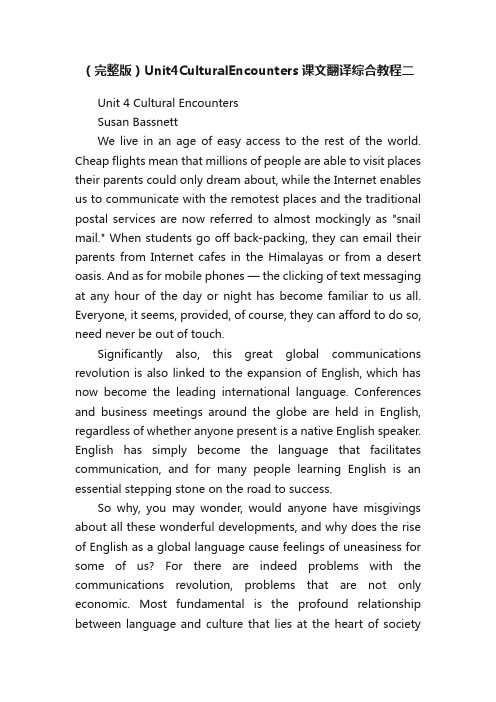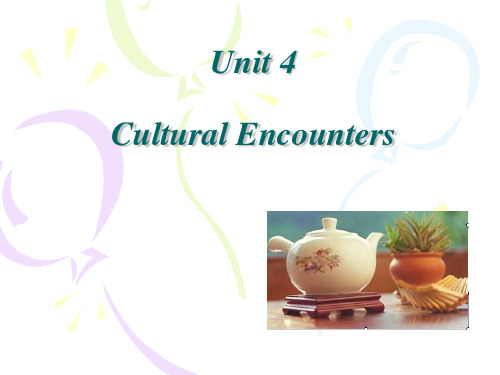Unit 4 Cultural Differences II
人教版高中英语必修四 Unit4 Body Language reading 课件

Para1 Body language is one of the most powerful means of communication, often even more powerful than spoken language. People around the world show all kinds of feelings, wishes and attitudes that they might never speak aloud. It is possible to "read" others around us, even if they do not intend for us to catch their unspoken communication. Of course, body language can be misread, but many gestures and actions are universal.
but many gestures and actions are universal. Para7 With so many cultural differences between people, it is great
to have some similarities in body language. We can often be wrong about each other, so it is an amazing thing that we understand each other as well as we do!
Para7 With so many cultural differences between people, it is great to have some similarities in body language. We can often be wrong about each other, so it is an amazing thing that we understand each other as well as we do!
(完整版)Unit4CulturalEncounters课文翻译综合教程二

(完整版)Unit4CulturalEncounters课文翻译综合教程二Unit 4 Cultural EncountersSusan BassnettWe live in an age of easy access to the rest of the world. Cheap flights mean that millions of people are able to visit places their parents could only dream about, while the Internet enables us to communicate with the remotest places and the traditional postal services are now referred to almost mockingly as "snail mail." When students go off back-packing, they can email their parents from Internet cafes in the Himalayas or from a desert oasis. And as for mobile phones — the clicking of text messaging at any hour of the day or night has become familiar to us all. Everyone, it seems, provided, of course, they can afford to do so, need never be out of touch.Significantly also, this great global communications revolution is also linked to the expansion of English, which has now become the leading international language. Conferences and business meetings around the globe are held in English, regardless of whether anyone present is a native English speaker. English has simply become the language that facilitates communication, and for many people learning English is an essential stepping stone on the road to success.So why, you may wonder, would anyone have misgivings about all these wonderful developments, and why does the rise of English as a global language cause feelings of uneasiness for some of us? For there are indeed problems with the communications revolution, problems that are not only economic. Most fundamental is the profound relationship between language and culture that lies at the heart of societyand one that we overlook at our peril.Different cultures are not simply groups of people who label the world differently; languages give us the means to shape our views of the world and languages are different from one another. We express what we see and feel through language, and because languages are so clearly culture-related, often we find that what we can say in one language cannot be expressed at all in another. The English word "homesickness" translates into Italian as "nostalgia," but English has had to borrow that same word to describe a different state of mind, something that is not quite homesickness and involves a kind of longing. Homesickness and nostalgia put together are almost, but not quite, the Portuguese "saudade," an untranslatable word that describes a state of mind that is not despair, angst (English borrowed that from German), sadness or regret, but hovers somewhere in and around all those words.The early Bible translators hit the problem of untranslatability head-on. How do you translate the image of the Lamb of God for a culture in which sheep do not exist? What exactly was the fruit that Eve picked in the Garden of Eden? What was the creature that swallowed Jonah, given that whales are not given to swimming in warm, southern seas? Faced with unsurmountable linguistic problems, translators negotiated the boundaries between languages and came up with a compromise.Compromising is something that speakers of more than one language understand. When there are no words in another language for what you want to say, you make adjustments and try to approximate. English and Welsh speakers make adjustments regarding the colour spectrum in the grey / green / blue / brown range, since English has four words and Welsh hasthree. And even where words do exist, compromises still need to be made. The word "democracy" means completely different things in different contexts, and even a word like "bread" which refers to a staple food item made of flour means totally different things to different people. The flat breads of Central Asia are a long way away from Mother's Pride white sliced toasties, yet the word "bread" has to serve for both.Inevitably, the spread of English means that millions of people are adding another language to their own and are learning how to negotiate cultural and linguistic differences. This is an essential skill in today's hybrid world, particularly now when the need for international understanding has rarely been so important. But even as more people become multilingual, so native English speakers are losing out, for they are becoming ever more monolingual, and hence increasingly unaware of the differences between cultures that languages reveal. Communicating in another language involves not only linguistic skills, but the ability to think differently, to enter into another culture's mentality and shape language accordingly. Millions of people are discovering how to bridge cultures, while the English-speaking world becomes ever more complacent and cuts down on foreign language learning programmes in the mistaken belief that it is enough to know English.World peace in the future depends on intercultural understanding. Those best placed to help that process may not be the ones with the latest technology and state of the art mobile phones, but those with the skills to understand what lies in, under and beyond the words spoken in many different languages.文化冲突我们生活在一个交流非常便捷的时代。
Unit 4 Culture大学英语听说4focus listening

— You also need to avoid standing so close to people that you make them (1) ________________ uncomfortable . — It’s never good manners to make fun of people, or be (2)_______ mean to them, to their faces or behind their backs. — It’s also poor manners just spread (3) ________ rumors and gossip. — You should try and avoid excessive (4) ______________ complaining and whining. — It’s not only poor manners. It is really (5) __________ annoying .
Play a video
II. Watching and Listening Now watch the video clip. Please get familiar with the words given below and then decide whether the following statements are true (T) or false (F).
Now Your Turn
Create a dialogue About Chinese Table Manners with your partner, referring to the useful expressions if necessary.
Useful Expressions 1. Always say... when you... 2. If you want to... try to... 3. It’s good to... /It’s a good idea to... 4. You also need to avoid... 5. You should try and avoid... Situation: A, a Chinese college student, is giving B, an overseas student, some advice on good table manners in China.
UnderstandingCulturalDifferences102页全书电子教案完整版课件

Unit 1 Understanding Cultural Differences
Section 1 More Things to Do
Activity 1 Read More About Understanding Cultural Differences
Hospitality In the west, when a guest is invited to
dinner, he or she should arrive on time. Otherwise you should call in advance to inform your host or hostess of the delay. During a dinner conversation, it’s customary to compliment the hostess on thewonderful meal. But when being praised, an American hostess would say, “Oh, I’m so glad you like it. I cooked it especially for you!” While the Chinese host or hostess would instead apologize for not giving the guests anything decent to eat although there may be more than
Section 1 More Things to Do
Hospitality
At the dinner table: Westerners tend to arrive on time
cultural-diversity-跨文化交际PPT课件

Kluckhohn and Strodtbeck’s Hofstede’s Dimensions Edward T Hall’s
Value Orientation
of Cultural Variability
Context - Culture Theory
Human Nature Man-nature
(10 mins)
.
17
2. Model by G. Hofstede (1984)
▪ Hofstede’s work was one of the earliest attempts to use extensive statistical data to examine cultural values.
rules and guideposts)
.
6
Why is one culture different from
another?
More deeply
▪ World view (religion)
- Spiritual and psychological needs of people (life and death, creation of universe, relationship between humans and nature)
1) = Human nature orientation 人性取向
2) = Man-nature orientation 人天取向
3) = Time orientation
时间取向
4) = Activity orientation
行为取向
5) = Social orientation
. 人际取向
大学英语教材4听力原文

大学英语教材4听力原文Unit 1 Life ChangesPart A1. W: I can't believe it's been four years since we started university.M: Yeah, time really flies. It feels like it was just yesterday when we were freshmen.Q: What are the speakers talking about?2. W: I've been feeling so stressed out lately. I have exams coming up next week.M: I understand how you feel. Make sure you take breaks and give yourself time to relax.Q: Why is the woman feeling stressed?3. M: I applied for an internship at a big law firm. I really hope I get it.W: Don't worry, you have a lot of experience and your grades are excellent. I'm sure you'll get the job.Q: What does the woman mean?4. W: Are you going to the club meeting tonight?M: No, I decided to quit. I need to focus on my studies and part-time job.Q: Why is the man quitting the club?5. W: I can't believe my brother is getting married next month. It feels like he was just a baby yesterday.M: I know what you mean. Time really does fly by.Q: What is the woman surprised about?Part BDirections: You will hear information about a university course. Listen carefully and answer the questions.Good morning, everyone. I'm here to introduce a new course that will be offered next semester. The course is called "Introduction to Environmental Science." This course would be of interest to students from different academic backgrounds, as it covers a wide range of topics related to the environment.Firstly, let me provide you with an overview of the course content. The course will explore major environmental issues, such as climate change, pollution, and resource depletion. We will discuss the causes and consequences of these issues, as well as potential solutions. Students will have the opportunity to develop a holistic view of the environment and understand the interconnectedness of various environmental processes.The course will consist of lectures, guest speakers, and group discussions. We will also incorporate field trips to environmental organizations and research institutes, allowing students to apply their knowledge in real-world settings. This hands-on experience will enhance students' understanding and give them a chance to engage with professionals working in the field.Assessment for the course will be based on class participation, assignments, and a final exam. This will encourage students to actively participate in discussions and apply what they have learned to solve environmental problems. Additionally, students will have the option to work on a group project, where they can further explore a specific environmental issue and propose solutions.The prerequisites for this course are an introductory science course and good English proficiency. It is open to both undergraduate and graduate students. For those interested, registration will open next week, and limited seats are available. I encourage you to take advantage of this opportunity to expand your knowledge and contribute to environmental sustainability.That's all for today's introduction. If you have any further questions, please feel free to ask. Thank you.6. What is the purpose of the talk?7. What topics will be covered in the course?8. How will students apply their knowledge in the course?9. What will assessment be based on?10. Who can take the course?Unit 2 Cultural DifferencesPart A1. W: I was surprised to learn that people in this country eat dinner so late in the evening.M: Yes, it's quite different from what I'm used to back home. But I've gotten used to it now.Q: What does the man say about the dinner time in this country?2. W: Excuse me, is it okay to give a gift with one hand in this culture?M: No, it's considered impolite. It's better to use both hands when presenting a gift.Q: What does the man say about giving gifts in this culture?3. M: I find it fascinating how people here greet each other with a bow.W: Yes, it's a sign of respect and politeness in this culture.Q: What do the speakers say about the bowing greeting in this culture?4. W: When I traveled to another country, I found the local customs and traditions to be very different from my own.M: That's what makes traveling so interesting. You get to experience different cultures firsthand.Q: What does the man say about traveling?5. M: I'm having a hard time adjusting to the food here. It's so different from what I'm used to.W: It takes time to get used to new flavors and cuisines. Don't worry, you'll adapt eventually.Q: What advice does the woman give to the man?Part BDirections: You will hear a conversation between a professor and a student who is studying abroad. Listen carefully and answer the questions.Professor: So, how are you finding your study abroad experience so far?Student: It's been great, Professor! I'm really enjoying it. The only thing is, I sometimes feel overwhelmed by the cultural differences.Professor: That's perfectly normal. It can be a bit challenging at first. Which aspect of the culture do you find the most different?Student: The concept of personal space is something I'm still trying to get used to. In my home country, people tend to keep a larger distance when talking to each other. Here, it's much closer, which I find a bit uncomfortable.Professor: Ah, yes. That's a common observation. In this country, physical closeness is seen as a sign of friendliness and warmth. People often stand closer to each other when conversing. It's an interesting cultural difference, isn't it?Student: It definitely is. I'm slowly adapting, but it still feels awkward at times. Another thing I've noticed is that punctuality is highly valued here. Back home, being a few minutes late is usually not a big deal. But here, it seems like everyone is always on time for appointments.Professor: Yes, that's true. Being on time is considered a sign of respect for others' time. It's important to be mindful of that cultural expectation. Are there any other cultural differences that have stood out to you?Student: Well, the food is quite different too. The flavors, spices, and even the eating etiquette are all new to me. It's been an adventure trying outnew dishes, though. I've discovered some amazing flavors I didn't know existed before.Professor: That's one of the joys of traveling and experiencing different cultures. It broadens your perspective and introduces you to new and exciting things. Don't hesitate to reach out if you have any more questions or concerns about adjusting to the cultural differences. I'm here to support you throughout your study abroad journey.11. What does the student find challenging about the cultural differences?12. How do people in the country view physical closeness when conversing?13. Why is punctuality highly valued in the country?14. What does the student say about the food in the country?15. According to the professor, what is one of the benefits of experiencing different cultures?。
高级英语阅读教程-unit4-Cultural differences

Word Pretest
• 5. superfluous • more than you need or want 过剩的;过多的
;多余的
• Eg. She gave him a look that made words superfluous.
• 她看了他一眼,这已表明一切,无须多言了。
Word Pretest
• the compilation of a dictionary • 词典的编纂
Word Pretest
• 6. exclusive
• 专用的,专有的,独有的,独占的 • 排外的;不愿接收新成员(尤指较低社会阶层
)的 • Selective 有选择的;认真挑选的 • Excluding prep. • not including 不包括;除…外
Word Pretest
• 2. forced smile • 苦笑;勉强的微笑 • Mask • N. 面具;面罩; 伪装;掩饰 • a gas/surgical mask • 防毒面具;医用口罩 • Her face was a cold blank mask. • 她装出一副冷冰冰毫无表情的样子。
Warm-up Questions
3. Most Westerners misunderstand that Chinese culture shares the common features with the Japanese culture. Can you explain the differences between Chinese culture and Japanese culture to them?
• 6. compilation
• 1) a collection of items, especially pieces of music or writing, taken from different places and put together 收集;选编;选辑
跨文化交际实用教程Unit 4

Question: Could you give Roger an explanation?
7
Case 2. A Misunderstanding Caused by a Joke
Comment
The
problem resulted from the misunderstanding of the word “hustle”. In colloquial American English, there are at least two meanings for the word “hustle”. ---- to force sb to make a decision before they are ready or sure; -----to work as a prostitute /romance or sex is hinted.
5
Case 2. A Misunderstanding Caused by a Joke Background information
Roger, the Personnel Executive of a large American multinational firm, worked in Brazil to help promote business. Rosalita, a Brazilian woman Roger had known for some time. Roger generally had a very good impression of her and always felt at ease with her. One evening, they met at a party, attended by both Roger‟s employees from the United States and many Brazilian business people.
英语选修2unit4作文

英语选修2unit4作文The Importance of Cultural Exchange。
Cultural exchange is the process of sharing ideas, beliefs, values, and customs between different cultures. It is essential for people to understand and respect each other's cultures, as it helps to promote harmony and understanding between different communities. In this essay, I will discuss the importance of cultural exchange and how it can benefit individuals and societies.Firstly, cultural exchange promotes mutual understanding and respect between different cultures. When people from different cultures interact, they learn about each other's customs, traditions, and beliefs. This helps to break down stereotypes and prejudices, and fosters greater tolerance and acceptance of diversity. For example, when a person travels to a foreign country and experiences the local culture, they gain a deeper appreciation of the people and their way of life.Secondly, cultural exchange can lead to the development of new ideas and innovations. When people from different cultures come together, they bring with them different perspectives and ways of thinking. This can sparkcreativity and innovation, as people collaborate and learn from each other. For example, the fusion of differentstyles of music has led to the creation of new genres, such as jazz and hip-hop.Thirdly, cultural exchange can have economic benefits. When people from different cultures trade goods and services, they create new markets and opportunities for growth. For example, the popularity of Japanese anime and manga has led to a thriving industry, with fans from all over the world buying merchandise and attending conventions.Finally, cultural exchange can contribute to global peace and security. When people understand and respect each other's cultures, they are less likely to engage inconflict and violence. For example, the United Nations Educational, Scientific and Cultural Organization (UNESCO)promotes cultural exchange as a means of promoting peaceand understanding between nations.In conclusion, cultural exchange is essential for promoting mutual understanding, creativity, economic growth, and global peace. It is important for individuals and societies to engage in cultural exchange, whether through travel, education, or other means, in order to buildbridges between different cultures and promote a more harmonious world.。
Unit 2 文化差异

学
2. A can of worms: taboos in America
5
Listen to a dialogue about communication taboos in America and do the exercises. A. Answer the following questions.
Back Next
Su Hui: Professor: Su Hui: Professor: Su Hui: Professor:
学
2. A can of worms: taboos in America
Notes
9
1. Yes, age is a very sensitive subject to many Americans, especially to women over the age of thirty. 是的,对于许多美国人,尤其是三十岁以上 的女人来说,年龄是个非常敏感的话题。 *sensitive a. 敏感的 e.g. Laura’s sensitive about her weight. *subject n. 话题,主题;对象 e.g. This is a book on the subject of love. *especially ad. 尤其,特别 e.g. I’ve never liked long walks, especially in winter. 2. How would a woman respond if I asked her, “How old are you exactly?” 如果我问一位女士:“请问你的真实年龄是……?”她会怎样回答呢? *exactly ad. 精确地,准确地,确切地 e.g. A TV replay showed exactly what had happened.
新探索研究生英语基础版u4课件

新探索研究生英语基础版u4课件English:In the fourth unit of New Exploration Graduate English Basic Edition, the focus is on the theme of "Cultural Differences." This unit explores the various aspects of cultural diversity, including language, customs, values, and communication styles. Students delve into the significance of understanding cultural differences in today's interconnected world, where globalization has brought people from different cultures into closer contact than ever before. Through discussions, readings, and exercises, students develop the skills necessary to navigate cultural differences effectively, whether in academic, professional, or social contexts. By fostering cultural competence, this unit aims to equip students with the tools to engage respectfully and successfully with individuals from diverse backgrounds, enhancing their ability to communicate and collaborate across cultural boundaries.中文翻译:在《新探索研究生英语基础版》第四单元中,主题集中在“文化差异”上。
Unit4

A new broom sweeps clean. Many hands make light work. Don’t put off until tomorrow what you
11
II. Detailed Study 1.Culturally Loaded Words
What is loaded words?
Loaded words and phrases are those which have strong emotional overtones (n. 暗示,弦外音,寓意 ) or connotations (n. 涵 义 , 言 外 之 意 ), and which evoke strongly positive or negative reactions beyond their literal meaning.
22
Things or concepts are represented by one or perhaps two terms in one language, but by many more terms in the other language, ie, finer distinctions exist in the other language;(社会科学)
In EC, it refers to people of high academic status (college professors) –much smaller range of people. not always a complimentary term, sometimes used in derogatory贬义的 sense.
Unit4 Cultural Encounters

Background information (1)
As Brown explains, “It is apparent that culture, as an ingrained set of behaviors and modes of perception, becomes highly important in the learning of a second language. • A language is a part of a culture, and a culture is a part of a language; the two are intricately interwoven so that one cannot separate the two without losing the significance of either language or culture.
• She is author of over 20 books, and her Translation Studies, (3rd ed. 2002) which first appeared in 1980, has remained consistently in print and has become the most important textbook around the world in the expanding field of Translation Studies.
Take Chinese and English idioms a drop in the ocean 沧海一粟 to laugh off one’s head 笑掉大牙 to shed crocodile tears 猫哭老鼠 to spend money like water 挥金如土 turn up one's nose at 嗤之以鼻 rain cats and dogs 倾盆大雨 black and blue 鼻青脸肿 at sixes and sevens 乱七八糟
全新版大学进阶英语综合教程II: Cultural Differences习题与答案

一、单选题1. Students should be encouraged to()different approaches to problems.A. adhereB. adoptC. adaptD. admire正确答案:B2. I dreamed of becoming a professional singer, but my voice was().A. not good enoughB. enough not goodC. not enough goodD. good not enough正确答案:A3. More and more people now understand the importance of()between work and family.A. reaching a consensusB. striking a balanceC. striving forD. falling through正确答案:B4. Life is not a school assignment. There are lots of problems that youcan’t()all by yourself.A. work outB. leave behindC. wash upD. help out正确答案:A5. Politicians always try to avoid expressing in public opinions that are considered()or unpopular.A. gratefulB. occasionalC. prominentD. extreme正确答案:D6. The young man drank too much at the party and could()remember anything when he found himself in the hospital.A. solelyB. occasionallyC. gratefullyD. barely正确答案:D7. Your()is requested at the seminar on Wednesday.A. presentB. preservationC. presenceD. perspective正确答案:C8. Fast foods offer convenience but they()of nutrition.A. fall shortB. fall onC. fall downD. fall over正确答案:A9. The statue is in a(n)()position in front of the Library.A. promoteB. proposalC. potentialD. prominent正确答案:D10. The old man()his shoulder before entering the building, making sure nobody was following him.A. looked afterB. looked aroundC. looked backD. looked over 正确答案:D。
最新全新版大学英语(第二版)听说教程4答案unit4

Unit 4 Dealing with Cultural Differences
• Having respect for / Learning about other cultures can help you avoid misunderstandings.
Unit 4 Dealing with Cultural Differences
Pre-listening Task
Language Focus
ning Task
Language Focus
• A person’s cultural background influences what he / she considers to be good manners or bad manners / polite or rude / on time or late.
Unit 4 Dealing with Cultural Differences
Pre-listening Task
Language Focus
Here are some sentences and structures that you might find useful in discussing the above questions.
2. How do people’s cultural backgrounds influence their way of thinking?
跨文化交际实用教程unit4

Verbal Communication
Objectives
Learn the culturally loaded words Learn the cultural reflections on
proverbs Learn taboos Learn the differences in cultural
patterns
III. Summary IV. Assignments
3
I. Warm-up cases
Case 1. Shoes for Street Walking Question : Why did the Italian shop owner
make such a blunder? Shoes for street walking. Come in and have a fit.
thought patterns
2
CONTENTS
I. Warm-up cases II. Detailed Study:
culturally loaded words cultural reflections on proverbs taboos differences in cultural thought
In China, dogs are insulting languages, meaning being despicable and hateful, so the idioms related to dogs usually has negative meanings, such as 走狗,丧家犬,看门狗,狗急跳墙,狗 仗人势,狼心狗肺,鸡鸣狗盗,蝇营狗苟。
Peacock– In Chinese it is an auspicious bird, so when the peacock spreads it tail, it represents auspiciousness, prosperity and peace. However, in English, peacock usualห้องสมุดไป่ตู้y means being pleased with oneself or showing off oneself, therefore, a person like a peacock suggests that he is as proud as a peacock
课件《综合英语(第二版)2》Unit4

Text analysis Structural analysis
Paragraphs 4-7
8
Main idea
It exemplifies that language and culture are so closely interrelated that often we find that what we can say in one language cannot be conveyed at all in another, and that confronted with insurmountable linguistic problems, translators negotiate the boundaries between languages and come up with a compromise.
Text analysis Structural analysis
1. Which sentence is the thesis statement?
The last sentence of the 3rd paragraph: “Most fundamental is the profound relationship between language and culture that lies at the heart of society and one that we overlook at our peril.”
人教版高中英语必修四unit 4 精品教案

人教版高中英语必修四unit 4 精品教案Unit 4 Body languageI.单元教学目标II.目标语言Ⅲ.教材分析和教材重组1.教材分析本单元以Body Language——“体态语”为中心话题,具体涉及什么是“体态语”,如何理解“体态语”,以及“体态语”的跨文化性等。
本单元的语言技能和语言知识也都是围绕“体态语”这一中心话题设计的,旨在通过单元教学,用听、说、读、写、做(表演)等多种形式,让学生正确认识和掌握“体态语”在交际中的作用和意义,使学生明确“体态语”在人类交际中的重要性,了解“体态语”在不同民族、不同文化交际中的多样性;使学生在今后的日常生活、学习、工作和交往中尽量减少或避免运用“体态语”时可能产生的误解,提高他们的“语言交际”能力和“非语言交际”能力。
1.1 WARMING UP 以列表对比(填充及增补)的形式,并通过WARMING UP 的活动,让学生了解有声语言与“体态语”的对应关系,了解语言意义与行为意义(“体态语”)在交际中具有同等重要的作用。
同时,学生在听、说、做(即表演“体态语”的动作)中能够增进对语言交际的感性认识,为他们在阅读过程中上升到对语言交际的理性认识打下基础。
1.2 PRE-READING 通过提供三个关于不同文化背景下“体态语”的问题,启发学生思考我们所学习的“语言”的目的、形式、功能。
通过引导学生联系自己日常生活的实际,提高学生努力学习英语的积极性和自觉性;同时培养学生留心社会、关注生活的洞察力,为引导学生进一步“阅读”作好准备。
1.3 READING 是一篇介绍性(记叙文)体裁的文章,主要介绍了各种文化背景下的“体态语”的异同,为学生提供了来自不同国度、不同语言文化背景的“体态语”及其在交际中的异同和影响的具体例证。
学生也可以结合自己在语言交际中所遇到的实际例子来进一步理解“交际,毫无问题可言吗?”这一主题。
1.4 COMPREHENDING 包括八个问题(前5个旨在检查学生对阅读材料细节的理解,6~7旨在引导学生对“体态语”的意义及文化差异的思考,第8个检查学生能否通过细节进行推理判断),通过对来自不同国度、不同语言文化背景的六个角色对待男女不同性别所使用的“体态语”异同的(学生在老师指导下的自我或小组讨论后的)归纳,进一步熟悉和掌握“体态语”在不同语言文化交际中的作用和意义。
Cultural Differences课件

strangers
• Power distance • Power in institutions and organizations
• small
• great
• Uncertainty avoidance index
• high
• low
• Masculinity
vs.
Femininity
Relationship of man Man subjugated to nature by nature Sense of time Past-oriented
activity
Being (who you’re) Growing Doing (action) (selfdevelopment)
Hierarchy group individual
• A tight social framework
Out group
Individualism vs. collectivism (Linell davis)
Attitudes and behaviors individualists collectivists
self
identity Communication Social value competition
I
Based on the individual Low context Speak your mind and tell the truth Less intimate with ingroups and less hostile to out-groups Value meeting new people
1) What is the character of innate human 2) 3) 4) 5)
